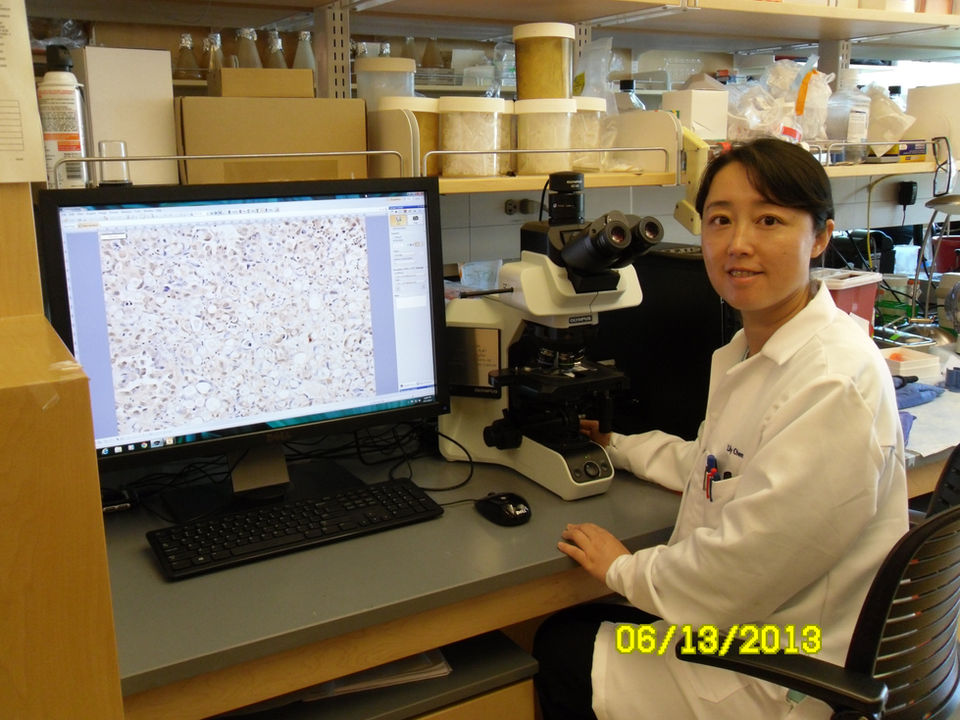
UNIVERSITY OF CALIFORNIA, SAN DIEGO
THE SCHLAEPFER LABORATORY
Integrins - FAK - Ovarian Cancer
Integrins are key cell surface receptors that control a variety of cell functions: adhesion, growth, survival, shape, and motility. Integrins do not possess intrinsic activity and function by activation of associated proteins. David Schlaepfer started studying the molecular events of integrin signaling as a postdoctoral research associate in the lab of Tony Hunter at the Salk Institute. In 1994, he showed that focal adhesion kinase (FAK) activation couples integrins to the mitogen-activated protein kinase signaling cascade (Nature 372: 786, 1994).
As an Assistant and Associate Professor at The Scripps Research Institute, Schlaepfer lab research focused on the role of FAK during mouse development in the control of cell motility and survival. Using FAK knockout cells, we elucidated a molecular linkage for FAK in growth factor receptor stimulated cell motility (Nature Cell Biol. 2: 249, 2000) and uncovered mechanisms driving FAK to the nucleus under to promote cell survival through the inhibition of the p53 tumor suppressor (Molecular Cell, 29: 9, 2008).
The Schlaepfer lab has been interested in understanding the importance of intrinsic FAK activity through the development and analysis of transgenic mice. In parallel, his group has worked with various pharmaceutical companies in pre-clinical development of small molecule FAK inhibitors. In 2007, the Schlaepfer lab moved to The Moores UCSD Cancer Center and Department of Obstetrics, Gynecology, and Reproductive Sciences and Division of Gynecologic Oncology to study the role of integrin signaling (FAK and Rgnef) in ovarian cancer. Although FAK is not highly mutated in cancers, FAK activation parallels amplification of the gene (PTK2) locus at 8q23 that commonly occurs in ovarian, endometrial, and cervical cancers associated with a poor prognosis.
The Schlaepfer lab has shown that FAK activity within blood vessel endothelial cells is a key step allowing tumor cell transmigration and metastasis (Journal of Cell Biology 204: 247, 2014) and has developed a new syngeneic murine ovarian cancer model that spontaneously acquired genetic copy number alterations and tumor aggressiveness similar to human serous ovarian cancer (eLife 8: e47327, 2019). These cells have been named KMF to denote gains in KRas, Myc, and FAK genes.
KMF cells possess elevated cancer stem cell properties and the enhanced ability to grow as three-dimensional tumorspheres with increased intrinsic resistance to cisplatin chemotherapy-induced death. Gene knockout and rescue assays are being used to delineate signaling pathways driving tumor aggression and immune evasion. The ROCKIF clinical trial at the Moores Cancer Center is built upon Schlaepfer lab findings and is testing whether taking a FAK inhibitor pill may provide benefit for patients with recurrent platinum resistant ovarian cancer.

DAVID SCHLAEPFER, Ph.D.
David was an Assistant and Associate Professor at The Scripps Research Institute from 1996 to 2007 before joining The Department of Obstetrics, Gynecology, and Reproductive Sciences at the UCSD Moores Cancer Center as a Professor in 2007. Over the last 20+ years, David has trained thirty graduate students, postdoctoral, or MD fellows who have achieved productive careers in academia, medicine or in the biopharmaceutical industry. He is motivated by basic research questions that have a strong translational potential. FAK is an exciting target to study because inhibitors to FAK are currently being tested in clinical trials, one of which is the ROCKIF (Resensitization of platinum-resistant ovarian cancer by kinase inhibition of FAK) trial at the Moores UCSD Cancer Center. David’s lab provides a supportive training environment that is interactive, focuses on enhancing verbal and writing communication skills, data analysis, and critical review.
























